One thing about Costa Rica is the country loves a good party! Costa Ricans are known for being gregarious and fun-loving and their enthusiasm is contagious when the country celebrates its numerous fiestas, festivals and horse parades.
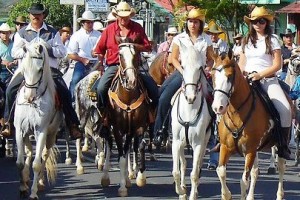 Plan your travel to Costa Rica during these cultural events and experience first-hand the country’s rich local traditions, tasty cuisine, vibrant music, and sense of fun. Make new friends and have a grand time! Costa Rica’s summer season definitely is jam-packed with fiestas; besides the main festivals, every town and community has its own “turno” (a town festival or country fair) to enjoy. However, there are plenty of cultural events and celebrations during Green Season too.
Plan your travel to Costa Rica during these cultural events and experience first-hand the country’s rich local traditions, tasty cuisine, vibrant music, and sense of fun. Make new friends and have a grand time! Costa Rica’s summer season definitely is jam-packed with fiestas; besides the main festivals, every town and community has its own “turno” (a town festival or country fair) to enjoy. However, there are plenty of cultural events and celebrations during Green Season too.
Team CRT – Costa Rica’s vacation experts – can help you design your Costa Rica vacation to fit in any of these cultural celebrations. Team CRT knows the best of the country, what to do and see, and they personalize it for you. Team CRT offers vacation packages, beach destinations, nature tours, adventure tours, relaxation vacations, family vacations, honeymoons, Fly & Drive packages, sport fishing trips, golf vacations, along with holiday packages to neighboring Panama and Nicaragua.
Here’s our list of main festivals and cultural events in Costa Rica throughout the year. (Note: All bullfights in Costa Rica avoid harming the bulls; there is no bloodshed.)
January
- New Year’s Day — National holiday.
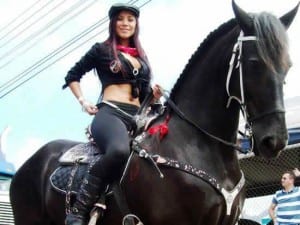 Fiestas Palmares (first 2 weeks of January) — Located in Palmares, near San Ramon in the Central Valley, these fiestas are some of the largest in the country. Featuring: a huge horse parade, bullfights, rodeo, live music concerts, dancing, rides and games, local foods, shopping.
Fiestas Palmares (first 2 weeks of January) — Located in Palmares, near San Ramon in the Central Valley, these fiestas are some of the largest in the country. Featuring: a huge horse parade, bullfights, rodeo, live music concerts, dancing, rides and games, local foods, shopping.- Fiestas Santa Cruz (week of Jan 15) — Set in Santa Cruz on the Nicoya Peninsula, these fiestas follow the Guanacaste cowboy traditions with bullfights, rodeo, a horse parade, and a party with food, concerts and fireworks.
- Copa del Cafe (Mid-January) — Week-long international youth (under 18) tennis tournament at the Costa Rica Country Club in Escazu (San Jose).
February
- Ash Wednesday — Given Costa Rica’s strong Catholic faith, this is a sacred day throughout the country.
 Puntarenas Carnival (last week of February) — A week of local celebrations in the Pacific port town of Puntarenas: street fairs and fiestas, music, dancing, food and sporting events.
Puntarenas Carnival (last week of February) — A week of local celebrations in the Pacific port town of Puntarenas: street fairs and fiestas, music, dancing, food and sporting events.- Liberia Fiestas (last week of Feb) – Biggest Guanacaste fiestas with a horse parade, bullfights, rodeo, musical concerts, dancing, food, rides and games.
- Monteverde Music Festival (February-March) – Top Costa Rican musicians and artists perform various concerts from the end of February to the end of March.
March
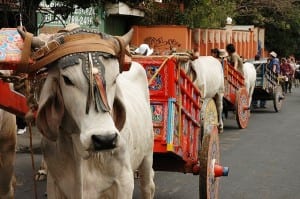 Oxcart Parade, San Antonio de Escazu (2nd Sunday of March) — A traditional parade of beautifully handmade and painted oxcarts, with their oxen teams and “drivers” in traditional costumes; food and dancing; blessing of the animals. In Escazu (San Jose).
Oxcart Parade, San Antonio de Escazu (2nd Sunday of March) — A traditional parade of beautifully handmade and painted oxcarts, with their oxen teams and “drivers” in traditional costumes; food and dancing; blessing of the animals. In Escazu (San Jose).- St. Joseph’s Day (March 19) — St. Joseph is the patron saint of the capital city, San José; banks, schools and businesses are typically closed. Special Catholic services are held across the country. Namesake towns celebrate with fiestas.
- National Orchid Exhibition (Mid-March) – Celebration of the country’s national flower and 1,200 orchid species; held in San Jose.
- Fruit Festival (Mid-March) – A huge open-air fruit market and festival in Orotina (on the way to the Pacific Coast from San Jose).
April
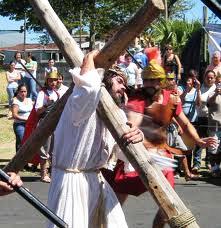 Holy Week (Semana Santa) — Holy Week is one of the biggest holidays in Costa Rica. Most businesses are closed the entire week, but Holy Thursday and Good Friday are national holidays. There are masses and processions leading up to Easter Sunday. Most Costa Ricans in the San Jose metropolitan area vacation at the country’s beaches this week.
Holy Week (Semana Santa) — Holy Week is one of the biggest holidays in Costa Rica. Most businesses are closed the entire week, but Holy Thursday and Good Friday are national holidays. There are masses and processions leading up to Easter Sunday. Most Costa Ricans in the San Jose metropolitan area vacation at the country’s beaches this week.- International Arts Festival (first 2 weeks of April or end of March depending on Easter) – Top international artists and national performers give performances in San Jose and other locations throughout the country (concerts, dance, theatre).
- Juan Santamaría Day (April 11) — Commemorates Costa Rica’s national hero, Juan Santamaria, who died defending Costa Rica against William Walker’s forces at the battle of Rivas in 1856. It is a national holiday; the majority of activities are held in Alajuela (parade, street fair, concerts).
May
 Labor Day (May 1) — National holiday celebrated with parades, marches and traditional food. This is also the day for the “state of the union” address from Costa Rica’s President to Congress and the people.
Labor Day (May 1) — National holiday celebrated with parades, marches and traditional food. This is also the day for the “state of the union” address from Costa Rica’s President to Congress and the people. - St. Isidro Labrador Day (May 15) — This holiday kicks off Spring and is celebrated all over Costa Rica honoring the patron saint of farmers with blessings of animals and crops. There are street fairs and parades with music, dancing and traditional food.
June
- Father’s Day (3rd Sunday in June) — Father’s Day in Costa Rica.
- St. Peter & St. Paul Day (June 29) — Namesake towns throughout Costa Rica hold processions and masses, and town fairs.
July
 Virgin of the Sea Festival (Saturday closest to July 16) — The Festival of the Virgin of the Sea is held in Puntarenas with a procession of colorfully decorated fishing boats carrying a statue of the city’s patron saint, “La Virgen del Monte Carmelo”. The secular celebrations include a week of parades, dances, regattas, and fireworks.
Virgin of the Sea Festival (Saturday closest to July 16) — The Festival of the Virgin of the Sea is held in Puntarenas with a procession of colorfully decorated fishing boats carrying a statue of the city’s patron saint, “La Virgen del Monte Carmelo”. The secular celebrations include a week of parades, dances, regattas, and fireworks.- Guanacaste Day (July 25) — Celebration of the annexation of Guanacaste from Nicaragua in 1824. It is a national holiday featuring school marching bands in parades, street fiestas, folk dancing, horse parade, bullfights, rodeos and cattle shows.
August
 Day of the Blessed Virgin of Los Angeles (Aug 2) — A national holiday honoring Costa Rica’s patron saint with a nationwide pilgrimage and religious processions to the Basilica in Cartago for a special mass.
Day of the Blessed Virgin of Los Angeles (Aug 2) — A national holiday honoring Costa Rica’s patron saint with a nationwide pilgrimage and religious processions to the Basilica in Cartago for a special mass.- Mother’s Day (Aug 15) — Mother’s Day in Costa Rica is a national holiday; all banks, schools and most businesses are closed.
- San Ramon Day (Aug 30) – Street fair, parade and religious processions in the town of San Ramon to honor their patron saint.
September
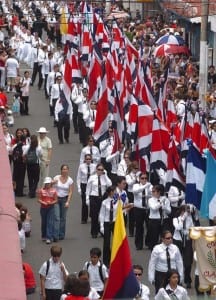 Independence Day (Sept 15) — Costa Rica gained independence from Spain on the same day as the rest of Central America in 1821. The nationwide celebration starts on Sept. 14 with the arrival of the Freedom Torch in Cartago (brought from Guatemala across Nicaragua by relay runners). At 6:00 pm, everyone in the country stops and simultaneously sings the national anthem; later in the evening, children carry small lanterns through their towns. On the 15th, there will be parades, traditional dancers and street parties in nearly every town in the country. This is one of Costa Rica’s biggest celebrations.
Independence Day (Sept 15) — Costa Rica gained independence from Spain on the same day as the rest of Central America in 1821. The nationwide celebration starts on Sept. 14 with the arrival of the Freedom Torch in Cartago (brought from Guatemala across Nicaragua by relay runners). At 6:00 pm, everyone in the country stops and simultaneously sings the national anthem; later in the evening, children carry small lanterns through their towns. On the 15th, there will be parades, traditional dancers and street parties in nearly every town in the country. This is one of Costa Rica’s biggest celebrations.
October
 Carnival / Cultural Day (week of Oct 12) — Week-long “Mardi Gras-style” party in Límon on Costa Rica’s Caribbean Coast, celebrating Columbus’ “discovery” of Costa Rica.
Carnival / Cultural Day (week of Oct 12) — Week-long “Mardi Gras-style” party in Límon on Costa Rica’s Caribbean Coast, celebrating Columbus’ “discovery” of Costa Rica.
November
- All Soul’s Day (Nov 2) — A religious day observed throughout Costa Rica with Catholic masses and family visits to cemeteries to remember loved ones.
December
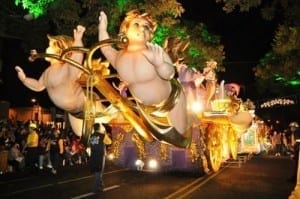 Festival of Lights (2nd Saturday in December) — Traditional Christmas parade in San Jose with large brightly lit and wondrously decorated floats, dancers, performers, and marching bands from across the country.
Festival of Lights (2nd Saturday in December) — Traditional Christmas parade in San Jose with large brightly lit and wondrously decorated floats, dancers, performers, and marching bands from across the country.- Christmas Week (Dec 24-31) — Dec. 25 is an official holiday, but most businesses and all government offices are closed during Christmas Week. Most residents of the San Jose metropolitan area go out to the beaches.
- Horse Parade (“Tope”) (Dec 26) — Costa Rica’s most distinguished horse parade on San Jose’s main boulevard, Paseo Colon, where riders wear traditional costumes and horses are vividly decorated. Riders and horses come from all over the country to show off their equine traditions and the unique Criollo breed.
- Desamparados Carnival (Dec 27) – “Mardi Gras-style” festival through the streets of San Jose.
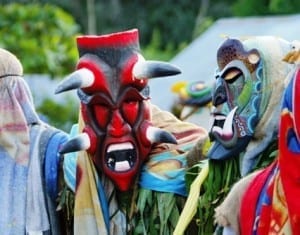 San Jose – Zapote Festival (Dec 25-31) – A huge festival in San Jose’s neighborhood of Zapote with the largest rodeo and bullfights of the country, rides and games, musical concerts, entertainment, food, shopping.
San Jose – Zapote Festival (Dec 25-31) – A huge festival in San Jose’s neighborhood of Zapote with the largest rodeo and bullfights of the country, rides and games, musical concerts, entertainment, food, shopping.- Festival of the Little Devils (Dec 31 – Jan 2) — Indigenous of southern Costa Rica’s Boruca region re-enact a battle between the bull (“El Toro,” representing Spanish troops) and the little devils (“Los Diablitos,” representing the Boruca Indians), showing how the Boruca people were never defeated as a tribe by Spanish conquistadors. The three-day cultural event features traditional costumes, artisan crafts and cuisine. It takes place in the village of Boruca, near Perez Zeledon.
By Shannon Farley
Comments